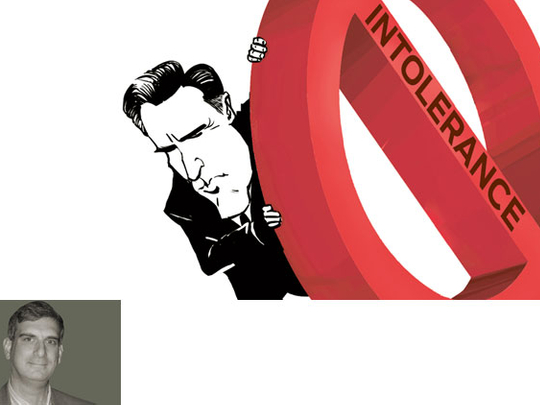
The US prides itself on a tradition of religious tolerance. The foundation of this tradition is the rigorous separation of religion and politics. These are among the most basic principles of American life and government. They are part of Americans' national identity.
The reality, however, is that the American relationship between religion and politics has never been that simple or straightforward, and as the current election season heats up there are unsettling signs that the intolerant side of American religiosity is coming to the fore.
There has long been a tension associated with the American idea of freedom of religion. The modern US is a country that sees religion as an important source of moral guidance, but in which a diminishing number of people actually attend religious services (though church attendance among Christians is far higher in the US than in most other western countries)
The attitude of many Americans was famously encapsulated by Dwight Eisenhower. "Our government," he said in 1952, "has no sense unless it is founded in a deeply felt religious faith, and I don't care what it is."
There has always, however, been a counter-trend. One which sees government's duty as protecting religion and defines this as ensuring that religious people need not be confronted with lifestyles or attitudes or popular entertainment they might find alien or offensive. For such people the government, over the last 40-50 years, has been a scandalous failure.
This is the tension at the heart of Rick Santorum's presidential campaign, and even though Santorum himself is unlikely to win the Republican party's presidential nomination it appears increasingly likely to dominate the rest of this election season in increasingly ugly ways.
Leave aside the persistent belief among Republican voters that President Barack Obama is a Muslim (and the accompanying assertion — usually unspoken but unmistakably held — that Islam ought to be a disqualification for the presidency). The interesting religious undercurrents of the moment are internal to the GOP.
For example, it is clear that Romney's Mormon faith has become a problem for his campaign. Few people will openly proclaim bigotry when speaking to a pollster, but it is no secret that many evangelical Christians — a key element of the Republican party's base — believe that the Church of Jesus Christ of Latter Day Saints is a cult.
There are many reasons why Mitt Romney cannot close the deal with GOP voters — why he does well, but never quite well enough to pull away from his opponents and claim the party's nomination: Romney has changed his position on virtually every issue that matters to Republicans, his attempts to pander to the party's right-wing base are a bit too painfully transparent, the candidate keeps bragging about his wealth in cringe-inducing ways. He often comes across as a kind of life-size, animatronic Ken doll.
Major issue
But it would be foolish to pretend that religion is not also an issue, particularly in the South and Midwest. CNN's exit polling following the recent primaries in Alabama and Mississippi showed that around half of the voters in those states said sharing a candidate's religion "mattered a great deal" to them. Among those voters Romney won the support of only 26 per cent in Mississippi and 16 per cent in Alabama.
Santorum has been careful not to criticise Romney's faith directly, but his appeals to Evangelicals and conservative Roman Catholics are couched in a language of exclusivity.
The core of his candidacy lies in an assertion that only certain types of Americans espousing a certain type of ‘traditional values' are fit to lead. He never utters the word ‘Mormon' but that is because, among the people he is addressing most directly, he does not have to.
The longer the Republican contest continues the more likely this sort of thing is to peep out into the open.
America's image as a religiously-tolerant country has taken more than a few hits in the decade since the 9/11 attacks, especially during Barack Obama's campaign and presidency.
The early stages of the Republican campaign were marred by more than a few bigoted statements by the candidates themselves (notably Santorum's support of religious profiling at airports and Herman Cain's assertion that he would not appoint a Muslim to his cabinet unless the appointee first passed a loyalty test).
Romney is, by all accounts, a devout Mormon and Mormons are all too aware of the bigotry and oppression their church has suffered during its relatively short history.
It is still more likely than not that he will be the GOP nominee. When he is, and when the inevitable whispering campaign regarding Obama's parentage, birthplace, religion and background gathers speed, one wonders whether Romney's own faith will give him the courage to confront bigotry and intolerance among his own supporters.
Gordon Robison, a longtime Middle East journalist and US political analyst, teaches political science at the University of Vermont.









